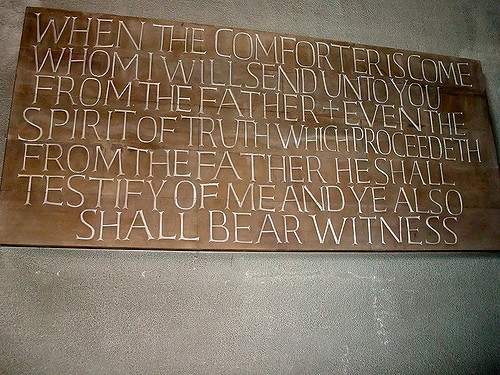 START WITH SCRIPTURE:
START WITH SCRIPTURE:
John 16:12-15
CLICK HERE TO READ SCRIPTURE ON BIBLEGATEWAY.COM
OBSERVE:
Jesus continues to explore the unique relationship within the Trinity, focusing more closely on the work of the Spirit of truth.
In the verses prior to our passage for this week, Jesus has explained why his departure is a good thing for the disciples. If he departs, he will send the Holy Spirit, the Counselor:
When he has come, he will convict the world about sin, about righteousness, and about judgment; about sin, because they don’t believe in me; about righteousness, because I am going to my Father, and you won’t see me any more; about judgment, because the prince of this world has been judged (John 16:8-11).
Jesus has revealed many truths to the disciples, but he is aware that they aren’t ready for all the truth that is to be revealed. They can’t bear them now. But the Holy Spirit will also reveal truths that come directly from the Father and the Son.
Note that the Spirit will not speak on his own initiative. None of his teachings will contradict what Jesus has revealed.
What the Father has also belongs to Jesus, and the Holy Spirit speaks for both the Father and the Son, and glorifies the Son. So there is a kind of interweaving network of relationship within the Trinity.
APPLY:
When we try to speak or write about the Trinity, it is a little like trying to photograph a starry sky. You can only focus on one small section of the sky at one time. And so it is with the Trinity.
Here, all that we focus on is the role of the Holy Spirit as the ongoing communicator for God. The Holy Spirit knows the mind of the Father and the Son because he is one with them — Father, Son and Holy Spirit are one God. And yet because the Holy Spirit is a distinct Person, the Holy Spirit has a different role.
And yes, when we start to speak about the Trinity, we do begin to find ourselves unable to articulate it all clearly. As when we stare at the vast skies at night, with no light pollution, we are reduced to silence by it all.
We can know what the Holy Spirit reveals to us; but we may also find ourselves frequently in awed silence at what remains a mystery.
RESPOND:
Nothing humbles me more when I speak of theology than trying to understand and explain the Triune nature of God. So many modern Christians fall unwittingly into ways of talking about the Trinity that were declared heretical long ago in the church. I call that “accidental heresy.”
I do believe that there are some truths that the Holy Spirit has definitely revealed to us, as Jesus says:
when he, the Spirit of truth, has come, he will guide you into all truth, for he will not speak from himself; but whatever he hears, he will speak. He will declare to you things that are coming.
I feel pretty certain that the entire New Testament can be explained as the truth that the Holy Spirit would come to reveal, particularly when we remember that nothing was written down by the apostles until at least twenty years after the resurrection of Jesus and the coming of the Spirit on Pentecost.
I certainly believe that the Holy Spirit was at work inspiring the writers of the New Testament from 50 A.D. to 100 A.D. And I would like to believe that the Holy Spirit continued to work in the life of the church through the councils and the synods later, and in the church even today — provided we understand that the Holy Spirit doesn’t contradict previously revealed truth in the Scriptures.
But I still have to admit that I feel like a child when it comes to understanding the Trinity. Perhaps Psalm 131 says it best for me:
Yahweh, my heart isn’t haughty, nor my eyes lofty;
nor do I concern myself with great matters,
or things too wonderful for me.
Surely I have stilled and quieted my soul,
like a weaned child with his mother,
like a weaned child is my soul within me (Psalm 131:1-2, World English Bible).
Our Lord, I don’t need to know everything; I know that I can’t know everything; what I need to know is what you need me to know about you and how you save and sanctify me, and how your love and light penetrate this present darkness. Guide me into your truth. Amen.
PHOTOS: "When the comforter is come whom I will send unto you from the Father. Even the spirit of truth which proceedeth from the father he shall testify of m" by allyhook is licensed under a Creative Commons Attribution-NonCommercial-NoDerivs 2.0 Generic license.

